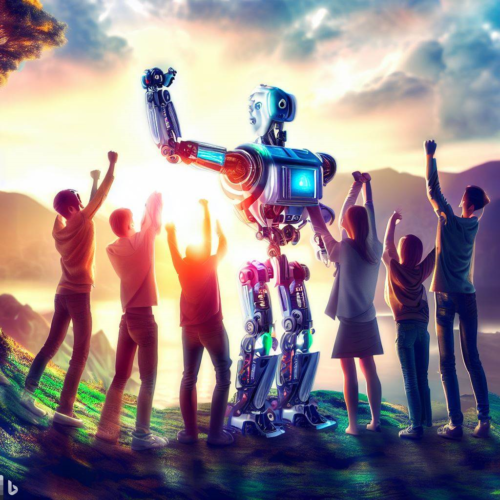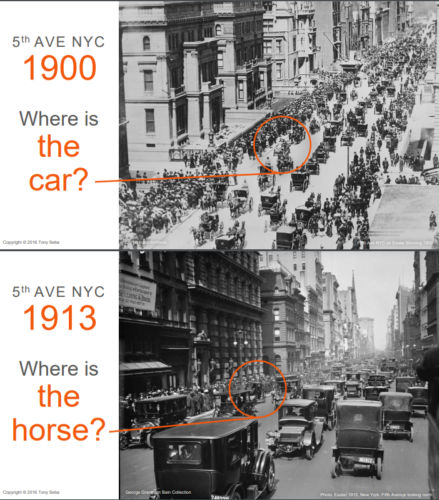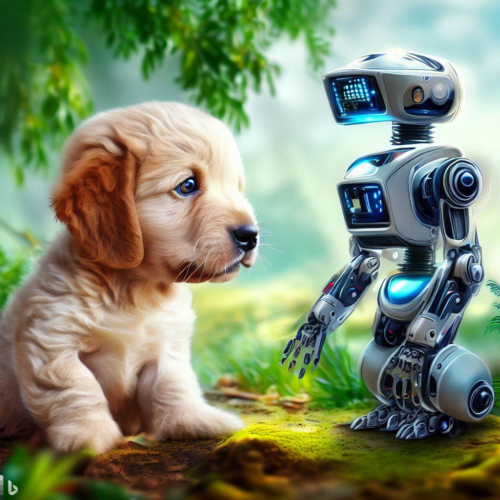Connecting with ChatGPT as an Educator
Article Date | 11 May, 2023By Shan Wikoon, Senior Lecturer in Business and Module Leader, LSST Elephant & Castle Article Date | 11 May 2023 XXX

Image: Created by Bing Image Creator but prompted by the author to ‘Create a photorealistic image of a group of young people celebrating victory with a futuristic robot set against a stunning natural backdrop’
XXXThe emergence of generative AI has opened up new avenues for educators in higher education. They can now leverage AI tools like ChatGPT to encourage collaboration and even use AI as a personalised one-on-one tutor. LSST is at the forefront of this new era of education, promoting innovation and empowering students to thrive in a world driven by AI.
The invention of AI represents a pivotal and inevitable milestone in human evolution and development. It is a natural progression of our innate desire to create more and more assistive tools. Just as we have historically developed various tools and machinery to aid in manual labour, AI now serves to support us in our intellectual endeavours, further enhancing our capabilities and enriching our lives.
The adoption of AI technology and its widespread utilisation is an unstoppable force. Who would revert to washing laundry by hand once they have gotten used to the convenience and efficiency of a washing machine? The image below illustrates the impact of the introduction of the motor car on transportation in the United States, causing disruption and transformation.
 (Seba, 2016)
(Seba, 2016)
The invention of the train is another example. Upon experiencing the increased speed and efficiency of rail transport, we were no longer content with the slow and laborious pace of horse-drawn wagons. Instead, we utilised trains to travel long distances and played a crucial role in the establishment of new cities and nations, shaping the world as we know it today.
At LSST, my educational approach focuses on two key aspects of AI integration: Firstly, I teach students how to effectively collaborate with advanced AI systems, such as ChatGPT, treating them as valuable team members. Secondly, I emphasise the potential of AI as a personalised and efficient, one-to-one tutoring tool, enabling students to unlock their full potential and achieve academic success.
AI as a team player
Throughout history, humans have developed a multitude of tools and machinery to assist with manual labour and intellectual tasks. In all our university-accredited courses, we place great emphasis on promoting teamwork skills and provide comprehensive coursework designed to enhance our students’ collaborative abilities. What is a team?
“a team is a small number of people with complementary skills, who are committed to a common purpose, performance goals and approach for which they hold themselves mutually accountable.” (Katzenbach and Smith, 1993)
While traditionally, the focus has been on teamwork amongst human peers, we have now shifted our attention towards the crucial skill of collaborating effectively with AI systems. This modern approach equips our students with the necessary competencies to succeed in an increasingly AI-driven world.
Before the introduction of tools like ChatGPT, our students were already being guided on utilising a range of features within the Microsoft Office suite that were powered by various forms of AI. These included Dictate, Immersive Reader, Reading Coach, Editor, as well as Designer in PowerPoint and Analyser in Excel. Our commitment to familiarising students with cutting-edge technology ensures that they are well-prepared for the evolving demands of the modern workplace.
For instance, the Designer feature in PowerPoint automatically generates relevant images and layouts when a student simply inputs text on a slide. This innovative tool streamlines the creative process, enabling users to create visually appealing and engaging presentations with ease, demonstrating the value of integrating AI into our daily tasks.
At the time of writing, we are eagerly looking forward to the integration of the Microsoft Copilot tool, which will bring the power of ChatGPT AI into all Office applications.
XXXAI as a one-to-one tutor

Image: Created using Bing Image Creator but prompted by the author to ‘create a photorealistic image of a very cute puppy interacting with a futuristic robot set against a stunning natural backdrop.’
At LSST, our students are also guided on how to use new AI tools as personal tutors. I am currently designing teaching materials for one foundation year module to guide the students on prompt engineering for this purpose.
Establishing a one-to-one AI tutor for every student could lead to a significant breakthrough in human history. This approach may offer a solution to the ‘two sigma problem’. The two-sigma problem is a concept that was introduced by educational psychologist Benjamin Bloom in 1984. It is based on the observation that students who receive one-to-one tutoring, using mastery learning techniques, perform significantly better than those in traditional classroom settings (Bloom, 1984).
The challenge presented as a ‘two sigma problem’ is finding a way to replicate the effectiveness of one-to-one tutoring in a scalable and cost-effective manner so that all students can benefit from this level of personalised education. The development of AI-powered tutoring systems holds the potential to address this issue by offering tailored learning experiences for each student.
‘My goal is to develop a truly customised AI tutor for higher education students (Wikoon, 2022). Check my previous blog: www.lsst.ac/blogs/are-you-teaching-or-joking-can-we-ask-the-robots-to-help/’
The progress so far…
XXXSome of our students possess exceptional speaking and analytical skills, being fluent in four or five languages and having gained valuable employment experience across various countries. However, they have previously struggled to achieve high grades in written coursework due to a lack of proficiency in English writing. We have already observed an improvement in the ability of our students to express their thoughts more effectively, owing to their use of AI technologies.
AI tools can offer valuable support in enhancing these students’ articulation and writing abilities. We indeed guide them not to become overly reliant on AI assistance, as this could lead to complacency, hinder the development of their writing skills, and raise concerns about academic integrity.
At LSST, we recommend that our students avoid treating AI like a household appliance such as a washing machine, where they can sit back and let it do all the work. Instead, we encourage them to use AI as a high-speed train that takes them to their destination with their valuable cargo of intellectual skills.
As a higher education institution, we are committed to fostering the development of innovative assessment tools that not only prevent the irresponsible use of technology but also actively encourage the creative and resourceful utilisation of AI solutions. New assessment tools should be utilised to enhance our problem-solving abilities, support our creativity, and expand our capacity to learn by demanding more and more individual efforts.
By nurturing collaboration with AI systems and harnessing the power of personalised AI tutoring, we should be cultivating a new generation of creative, resourceful, and intellectually adept leaders.
ChatGPT prompt used to assist writing this blog:
As a proficient writing assistant specialising in British English, your task is to transform my thoughts into professional language. If you need clarification, ask me before you respond.
XXXFurther reading
The Amazing AI Super Tutor for Students and Teachers | Sal Khan | TED on https://youtu.be/hJP5GqnTrNo
XXX
References
XXXBloom, B. (1984) ‘The 2 Sigma Problem: The Search for Methods of Group Instruction as Effective as One-to-One Tutoring’, Educational Researcher, 13(6), pp. 4–16. https://doi.org/10.3102%2F0013189X013006004
Katzenbach, J.R. and Smith, D.K. (1993) The wisdom of teams: creating the high-performance organisation. Boston: Harvard Business School Press.
Khan, S. (2016) The Amazing AI Super Tutor for Students and Teachers | Sal Khan | TED. 1 May. Available at: https://youtu.be/hJP5GqnTrNo (Accessed: 08 May 2023)
Seba, T. (2016) Clean Disruption Why Conventional Energy and Transportation Will Be Obsolete By 2030. Conference Presentation. Available at: https://people.wou.edu/~mcgladm/Geography%20470%20Energy/tony%20seba%20slides.pdf (Accessed: 08 May 2023)
Spataro, J. (2023) Introducing Microsoft 365 Copilot – your copilot for work. Available at: https://blogs.microsoft.com/blog/2023/03/16/introducing-microsoft-365-copilot-your-copilot-for-work/ ( Accessed: 08 May 2023)
Wikoon, S. (2022) Are you teaching or joking? Can we ask the robots to help? Available at: https://www.lsst.ac/blogs/are-you-teaching-or-joking-can-we-ask-the-robots-to-help/ (Accessed: 08 May 2023)




